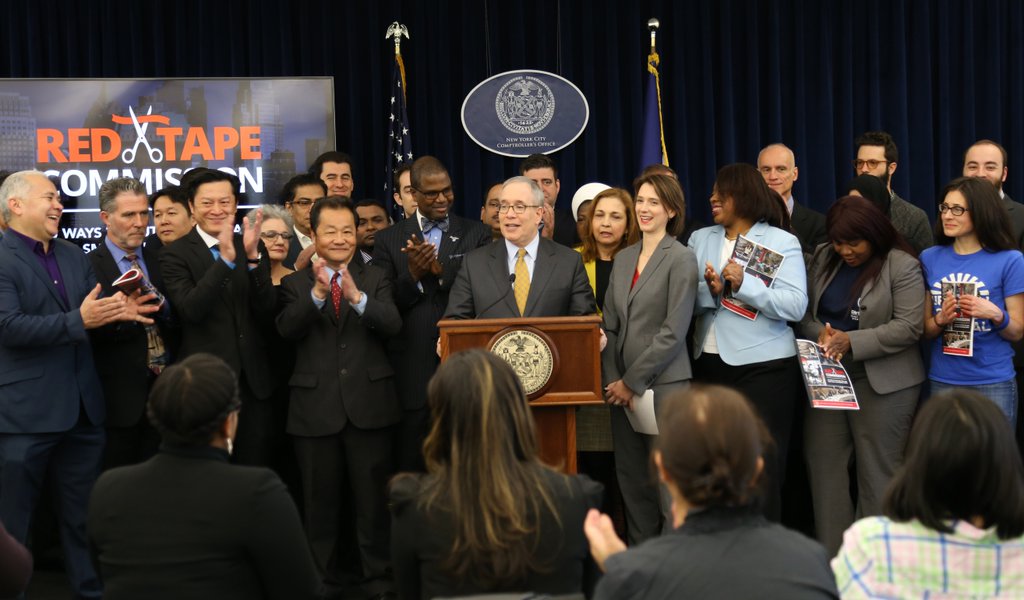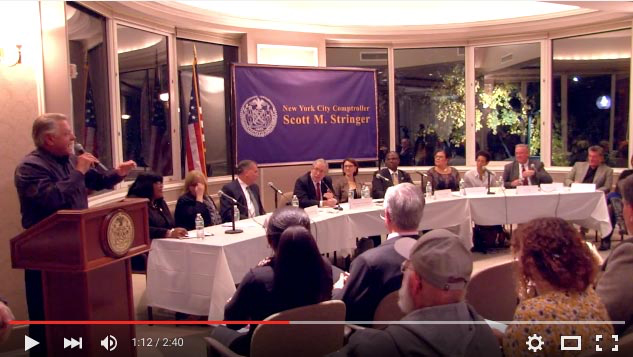Comptroller Stringer Red Tape Commission: Small Businesses Need More Help And Communication, Less Bureaucracy And Delay From City Agencies

Survey finds 30% of small businesses forced to wait six months or more to get necessary approvals from City
58% say agencies fail to communicate expectations adequately
60 recommendations include replacing private expeditors with professional staffers, establishing clear timelines for permit approvals
(New York, NY) – Nearly one-third of small business owners wait six months or longer for approvals they need from the City to open their business, and four in ten said they had to hire private expeditors to navigate City bureaucracy, according to a new survey released today as part of the final report of New York City Comptroller Scott M. Stringer’s year-long Red Tape Commission which includes 60 recommendations to ease the burden on small businesses. The Red Tape Commission is a group convened by Comptroller Stringer of 31 small business leaders, regulatory experts, and advocates from across the City, co-chaired by Jessica Lappin, President of the Alliance for Downtown New York, and Michael Lambert, Executive Director of the Bed-Stuy Gateway Business Improvement District.
“Small businesses are the backbone of our City’s economy, but too often government is a barrier, not a partner, in helping them grow,” Comptroller Stringer said. “When it takes months on end to get permits and half of business owners don’t feel like they get a fair shake from the City, it’s time to take a sledgehammer to the bureaucracy.”
To view a video of the Red Tape Commission’s findings, please click the image below.

The Red Tape Commission took a bottom-up approach to finding ways to improve conditions for small businesses: by listening directly to scores of small business owners at hearings in all five boroughs and conducting an online survey of almost 300 entrepreneurs in a range of different sectors. The result is a comprehensive review of the bureaucracy that every small business owner must navigate in New York City — a labyrinth that includes more than 6,000 rules, 250 licenses and permits, and 15 agencies.
Findings from the online survey include:
- Small businesses suffer from painfully slow approval processes.
- 30% of small businesses surveyed said it took them six months or longer to get all the approvals they needed from the City to open for business, and 13% said it took more than a year.
- Lack of fairness and poorly communicated information.
- Nearly half of all business owners surveyed (48%) said they did not feel like they had been treated fairly by City agencies, and 58% said agencies failed to adequately communicate expectations and requirements.
- Broad dissatisfaction with City agencies.
- When asked to grade City agencies on a scale of 1-5, with 1 being very unsatisfied, business owners gave most agencies a grade of 2. The Buildings Department, Office of Administrative Trials and Hearings, the Taxi and Limousine Commission and the Department of City Planning were the least satisfying to engage, while the Fire Department and Department of Small Business Services got the highest marks.
- Privately hired “expeditors” add cost but little value.
- Nearly 40% of small businesses surveyed said they found it necessary to hire a private “expeditor” to navigate City bureaucracy. Expeditors are private “fixers” hired to navigate the arcane bureaucracy, principally at the Department of Buildings. But more than half of respondents said expeditors were neither helpful nor effective.
- Small businesses are frustrated.
- Asked to identify their single greatest frustration with City government, fines and inspections were cited by 20% of respondents as the most common complaint, followed by agency response times (18%) and high taxes and fees (17%).
“Small business owners deserve better than this,” Stringer said. “If we want to expand economic opportunity and give every New Yorker a fair chance to make it in our City, we need to cut the red tape that is holding small businesses back.”
To do so, the Commission’s recommendations include:
- Establishing clear timelines for the approval of permits and holding agencies accountable if timelines are not met.
- Too many small business owners pay top dollar for permit fees and wait months for agencies to approve applications, which very often have no timelines attached to them. Agencies should establish clear timelines for processing applications and publicly release on-time performance measures, allowing agency heads to be held accountable.
- Abolishing expeditors at the Department of Buildings and creating Small Business Advocates in relevant City agencies.
- Expeditors should be removed from the process and replaced with Small Business Advocates, professional staffers dedicated to serving all applicants and advocating for more small business friendly rules and processes.
- Improving services for Limited English Proficient New Yorkers.
- Business owners who have limited English proficiency often have a very difficult time navigating the City bureaucracy and understanding how to comply with the law. The City can do more to improve these services, including providing better translations of websites and more guides, documents, and notices and in additional key languages of the City.
- Helping business owners to learn how to comply with rules and regulations rather than relying on fines.
- Currently, restaurateurs must pay $400 to obtain a consultative session with the Department of Health and Mental Hygiene. This discourages restaurants from engaging with the City and creates a culture of distrust.
- Making better use of technology.
- Many of the challenges small business owners described could be mitigated through better use of technology. For instance, if a business owner can track the whereabouts of a package they’ve mailed, applicants should be able to track a permit throughout the approval process in real time. Similarly, agencies should make wider use of electronic filing for permit and license applications and develop more online training courses and videos to make it easier for small business owners to interact with City agencies.
- Reforming the Commercial Rent Tax.
- The rapid increase of commercial rents is pushing many small businesses out of Manhattan. To help these business owners, the City Council should reform the Commercial Rent Tax.
“Last week my office released a report which found that City revenue from small business fines were down 20 percent and I commend Mayor de Blasio for taking a new approach to reduce this and other burdens on business owners. But there is more that we can do. We’ve presented 60 solutions to help cut red tape and bureaucracy – now it’s time to implement these common-sense reforms,” Stringer said.
To view information about the Red Tape Commission, please click here.
To view the full Red Tape Commission report, please click here.
To view a video of the findings of the Red Tape Commission, please click here.
“New York’s small businesses make up 95 percent of all businesses, employ almost 1 million workers and are the driving force of our economy. They are vital to our future and deserve the best the city can offer,” said Jessica Lappin, President of the Alliance for Downtown New York. “It’s time the City step up to provide the improved services, responsiveness and assistance the community needs in order to thrive. Let’s enable even more New Yorker’s to realize their entrepreneurial dreams. I thank Comptroller Stringer for his leadership in convening the Commission, my Co-Chair Michael Lambert and all of the businesses owners who participated and guided our work throughout this process.”
“The Red Tape Commission heard stories from hundreds of the City’s entrepreneurs, business owners, and small business advocates about the challenges they face when trying to open and grow their businesses,” said Michael Lambert, Executive Director of the Bed-Stuy Gateway BID. “We’ve taken a ground-up look at many of the problems that have adversely impacted New York City’s small business community and directly incorporated the feedback from those who have faced these challenges into the Commission’s recommendations. These reforms could be a game changer for existing and future businesses throughout New York City. It has been my pleasure to serve as the Co-Chair of Comptroller Stringer’s Red Tape Commission along with Jessica Lappin and I look forward to helping to implement the Commission’s recommendations in the near future.”
###